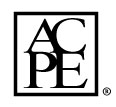
|
7:00 - 8:00 AM
|
Breakfast & Registration
|
|
8:00 - 9:00 AM
|
Opening Session:
Blood Basics and Beyond: Supply, Needs and Future Products
|
|
9:15 - 10:15 AM
|
Breakout 1 (choose one):
Value Based Healthcare Delivery
Diabetes Guideline and Clinical Trials Update
|
|
10:30 - 11:30 AM
|
Breakout 2 (choose one):
Pharmacovigilance Risk Management: Enhancing Patient Safety
Staying on Your Side of the Net
|
Date: Apr 6, 2019 07:00 AM - 11:30 AM
Fee
CE Hours
Registration closes on Apr 06, 2019 08:00 AM
Activity Type
- Knowledge
Target Audience(s)
- Pharmacists
Accreditation(s)

|
St. Louis College of Pharmacy at the University of Health Sciences and Pharmacy in St. Louis is accredited by the Accreditation Council for Pharmacy Education as a provider of continuing pharmacy education. To learn more about the specific program information, including universal activity numbers (UAN's) and learning objectives, please expand the modules below. Following successful completion of an evaluation, CE credit will be automatically reported to NABP through the CPE Monitor system, using the NABP ePID numbers and date of birth (MMDD) stored in participants' user profiles. Follow this link to learn more about CPE Monitor and the credit reporting process » Participants are responsible for ensuring receipt of credit; no credit can be corrected or awarded if more than 60 days have passed from the date of the event or if the home study is expired.
It is the policy of St. Louis College of Pharmacy at the University of Health Sciences and Pharmacy in St. Louis, to ensure balance, independence, objectivity and scientific rigor in all its educational programs. All faculty participating in this program are expected to disclose to the program audience any real or apparent conflicts of interest related to the content of the presentation.
|
Requirements for CE Credit
- Visit this site. Make sure you are logged in and registered before proceeding.
- Complete an evaluation by clicking the green evaluation button for each session/block.
- Enter the evaluation code that was given to you at the end of the session you attended.
- Answer all questions honestly - we appreciate your feedback! All responses are stored anonymously.
- Click submit. As soon as you submit, a report containing the NABP ePID and DOB stored in your profile will be automatically sent to CPE Monitor.
- Please allow up to 48 hours for processing. Your credit should appear in your NABP profile online.
If you experience difficulty, please contact our office so that we may assist you. We are happy to help!
Registration closes on Apr 06, 2019
at 08:00 AM
Registration Closed
Objectives
- Identify issues with treating life-threatening hemorrhage in the pre-hospital setting.
- Describe artificial and freeze-dried blood products in development.
Activity Number
0033-9999-19-022-L01-PCE Hours
Registration Closed
In health care, the days of business as usual are over. Around the world, every health care system is struggling with rising costs and uneven quality, despite the hard work of well-intentioned, well-trained clinicians. It's time for a fundamentally new strategy. At its core is maximizing value for patients: that is, achieving the best outcomes at the lowest cost. We will discuss strategy for moving toward a patient-centered system organized around what patients need and patient outcomes achieved.
Objectives
- Describe value-based healthcare in the context of capitalism and competition.
- Identify value in practical terms that can be measured.
- Explain the interrelationship between quality outcomes, cost and value.
Speaker(s)/Author(s)
|
Robert Salter, Ed.D.
|
Activity Number
0033-0000-19-001-L04-PCE Hours
Registration Closed
Objectives
- Distinguish medication therapy recommendation changes in the 2019 vs 2018 American Diabetes Association (ADA) Standards of Medical Care.
- Identify diabetes medications that have shown to decrease major adverse cardiovascular events (MACE).
Speaker(s)/Author(s)
|
Laura Challen, Pharm.D., MBA, BCPS, BCACP
Brief Bio : Dr. Laura Challen is a graduate of the University of Texas College of Pharmacy. Since completion of her Pharmacy Practice Residency with an Emphasis in Managed Care at The Massachusetts College of Pharmacy and Health Sciences in 2006, Dr. Challen worked at the Harris County Hospital District, in Houston, Texas where she started and managed outpatient clinical pharmacy services. Dr. Challen then moved to St. Louis, Missouri in 2012 and became an assistant professor at the St. Louis College of Pharmacy. She spends 50% of her time in the John F. Kennedy Internal Medicine Clinic at Mercy Hospital St. Louis assisting with chronic disease state management, drug information, precepting students, completing research and helping to educate the Internal Medicine Residents in clinic. Dr. Challen spends the rest of her time at the College of Pharmacy coordinating an Integrated Pharmacotherapy Endocrinology course and providing various different lectures throughout the year. Dr. Challen became a board certified pharmacotherapy specialist in 2007, a board certified ambulatory care pharmacist in 2014 and completed her Master’s in Business Administration at the University of Houston in 2010. |
Activity Number
0033-0000-19-003-L01-PCE Hours
Registration Closed
Objectives
- Discuss emerging trends in pharmacovigilance risk management and risk minimization.
- Describe various regulatory requirements for risk management plans (RMPs) and risk evaluation and mitigation strategies (REMS) development.
- Compare and contrast methods to implement additional risk minimization measures globally.
Speaker(s)/Author(s)
|
Carla Perdun Barrett, Pharm.D.
|
Activity Number
0033-0000-19-015-L05-PCE Hours
Registration Closed
Objectives
- Describe the pinch-crunch cycle.
- Explain tools to assist in managing individual and group conflict.
Speaker(s)/Author(s)
|
Andrea Guimaraes, M.S.
|
